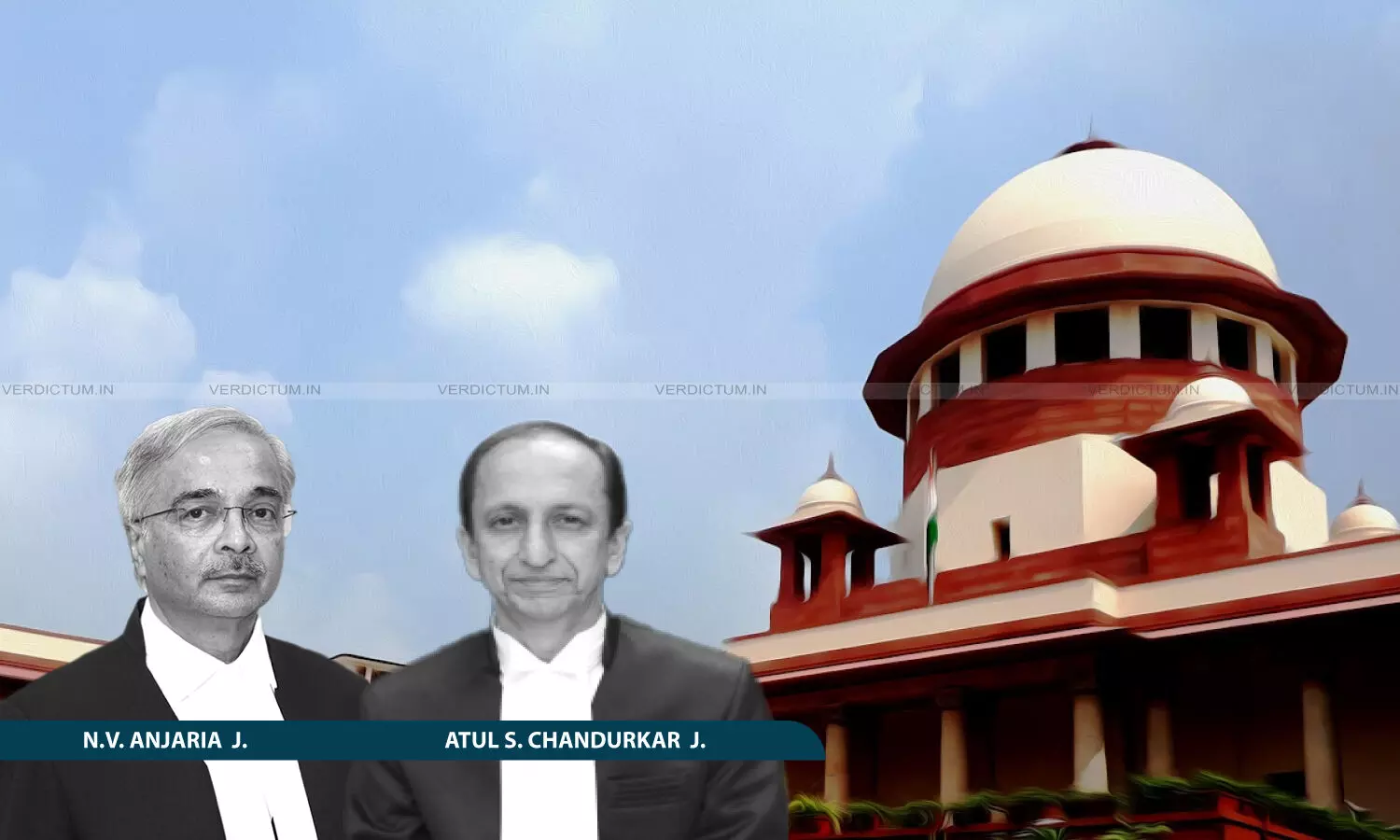
Justice N.V. Anjaria, Justice Atul S. Chandurkar, Supreme Court
Grant Of Motor Accident Compensation For Loss Of Future Income Is Distinct From Compensation Granted For Permanent Disability: Supreme Court
 |
|The appellant claimant approached the Supreme Court challenging the judgment of the Madras High Court reducing the amount of compensation awarded to him by the Motor Accidents Claims Tribunal.
While granting enhanced motor accident compensation, the Supreme Court has held that the grant of compensation for loss of future income is a distinct head from the one under which compensation is granted for permanent disability.
The appellant claimant approached the Apex Court challenging the judgment of the Division Bench of the Madras High Court as a result of which the amount of compensation that was awarded to him by the Motor Accidents Claims Tribunal came to be reduced.
The Division Bench of Justice N. V. Anjaria and Justice Atul S. Chandurkar held, "The grant of compensation for loss of future income is a distinct head from the one under which compensation is granted for permanent disability. In the light of the fact that the claimant suffered 100% permanent disability and was living in a vegetative state, the High Court was not justified in setting aside the grant of compensation under this head. In our view, considering the nature of disability suffered by the claimant, he would be entitled to amount of Rs. 5 lacs under this head."
Advocate Harsha Tripathi represented the Appellant while Advocate S. Raj Makesh represented the Respondent.
Factual Background
The incident dates back to the year 2011 when the claimant was travelling in a bus which met with an accident. Various passengers suffered grievous injuries. Insofar as the claimant is concerned, he too suffered serious injuries resulting in 100% permanent disability. He was required to undergo treatment for a considerable period of time. When the accident occurred, the claimant was aged about 21 years and was pursuing the degree course in Arts. In view of the aforesaid accident, the claimant filed a petition seeking compensation of an amount of Rs 1 crore under Section 166 of the Motor Vehicles Act, 1988.
Along with the aforesaid claim petition, various other claim petitions were filed by other injured passengers who were travelling in the said Omni bus. All the claim petitions were tried together. The Tribunal saddled the insurance company with the liability of paying compensation. An amount of Rs.67,83,866 came to be awarded as compensation to the claimant. In appeal, the High Court reduced the amount of compensation by Rs 19 lakh. Aggrieved by the reduction in the amount of compensation as well as the refusal to enhance the amount of compensation, the appellant approached the Apex Court.
Reasoning
The Bench was of the view that the High Court was not justified in reducing the quantum of compensation that was awarded by the Claims Tribunal. The fact that the claimant had suffered 100% disability and that he was in a vegetative state was not questioned by the owner of the vehicle or the insurance company. The Bench also noted that the age of the claimant was 21 years when the accident took place and was pursuing his education at that point in time.
The Claims Tribunal was of the view that even after being discharged from the hospital, he would be required to undergo periodical medical checkups. Future medical expenses were calculated at the rate of Rs. 3,000 per month for a duration of 25 years, and on that basis, an amount of Rs. 9 lakh came to be awarded. As per the Bench, the reduction in the amount granted towards future medical expenses by the High Court was totally unjustified. “Though the figure of Rs. 3,000/- per month as granted appears to be reasonable, in our view restricting the amount of future medical expenses only for a period of 25 years appears to be unjustified”, it said.
The Bench thus held that the amount granted towards future medical expenses deserved to be enhanced, keeping in view the average life expectancy. The amount of Rs 3 lakh towards loss of enjoyment of life and amenities also stood restored. The claimant having suffered permanent physical disability to the extent of 100%, the Bench mentioned that he would definitely require assistance during his life. An amount of Rs 10 lakh was granted towards attendant charges.
The Bench further noticed that the Claims Tribunal awarded an amount of Rs 3 lakh towards pain and suffering to the family members of the claimant after relying upon the decision of the Division Bench of Madras High Court in Dhamodaran (deceased) and others vs. Bhaskar Sekar and another (2018) but the High Court set aside the grant of compensation under this head, again without assigning any reason.
The Bench stated,“When the Claims Tribunal had awarded compensation under the head of pain and suffering of family members by relying upon the judgment of the High Court, another coordinate Bench of the same High Court could not have ignored the said judgment while setting aside the grant of such compensation by the Claims Tribunal. We do not find any reason whatsoever to deny the claimant the grant of compensation under this head. Accordingly, the compensation of Rs. 3 lacs towards pain and suffering of family members stands restored.”
Allowing the appeals, the Bench ordered, “...it is held that the claimant would be entitled to an amount of Rs. 82,83,866/- as compensation under Section 166 of the Act of 1988. The unpaid amount of compensation shall be paid to the appellant within a period of four weeks from today with interest at the rate of 7.5% per annum as directed by the Claims Tribunal.”
Cause Title: Kavin v. P. Sreemani Devi & Ors. (Neutral Citaiton: 2025 INSC 1028)
Appearance
Appellant: Advocates Harsha Tripathi, AOR Balaji Srinivasan, Advocates S. Sabarivasan, Vishwaditya Sharma, Kanishka Singh, Subornadeep Bhattacharjee, Rohan Dewan, K. Shiva, Aakriti Priya
Respondent: Advocate S. Raj Makesh, AOR Nikhil Swami, Advocate Divya Swami, AOR Prerna Mehta